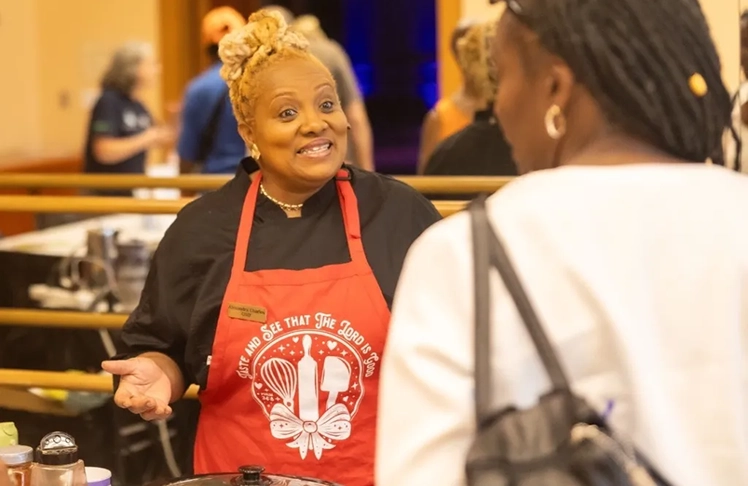
by Aaliyah Amos
In Newark, the smell of bubbling tomatoes, beans, and spices set the stage for more than a cooking demo — it marked a moment of racial healing. At the New Jersey Performing Arts Center (NJPAC), local chefs, health leaders, and community advocates gathered this summer to confront food insecurity and the inequities that keep families from accessing healthy meals.
The program, Nourishing Communities, Confronting Food Insecurity Together, closed NJPAC’s Standing in Solidarity 2024–25 season. The social justice initiative is built on dialogue, art, and shared experiences. By combining food, conversation, and resources, the gathering reflected a vision of racial healing: creating spaces where people name the wounds of injustice, share lived experiences, and work together to build healthier, more connected communities.
Cooking as Community Healing
Local chefs Sean Hassan and Alexandra Charles showed how food can be both sustenance and a tool for change. Charles taught attendees how to make a vegan-friendly pantry stew with elbow pasta, tomato sauce, black beans, mixed vegetables, and more dumped into a crock pot for a one-step, no-stove-top-needed dish.
“The knowledge stays right here with me if I don’t partner with the community centers and the community, like this event today,” says Charles, a vegan due to health reasons. She explained that she supports food insecurity efforts after experiencing a lack of access to healthy and nourishing foods herself.
Meanwhile, Hassan, along with one of his students from his nonprofit cooking organization, Palette Program, served guests fresh vegetables, corn chips, and birria chicken.
“There’s a restriction of food that comes into our neighborhood,” Hassan says. “When I come into communities like ours, food deserts are more of a food apartheid.”
Conversations That Spark Change
The evening also included a screening of “Starved: Our Food Insecurity Crisis,” produced by WQED Pittsburgh, and a panel of health and nonprofit leaders discussed how systemic change requires collaboration.
“If strong institutions come together, voice together, that’s a way to move things forward,” said panelist Dr. Balpreet Grewal-Virk, senior vice president of community health for RWJBarnabas Health.

“Since our program began in 2020, we’ve reached more than 30,000 people virtually and in-person,” said Donna Walker-Kuhne, senior advisor of social impact at NJPAC. “Every conversation unpacks important topics and supplies useful resources from our wonderful partner organizations. With rising rates of food insecurity in New Jersey, shining a spotlight on public and private organizations that are feeding their neighbors was an important way to conclude our Standing in Solidarity season.”
Healing Through Connection
Beyond policy and programs, the event highlighted the healing power of connection. Nonprofits like Toni’s Kitchen, a restaurant-style soup kitchen in Montclair, shared resources directly with attendees.
Carol Costello, Event Coordinator at Toni’s Kitchen, said events like these are “a way to connect with various groups who might be interested in what we do and in supporting us or using our services.”
For Costello, the most rewarding part of her work is witnessing the day-to-day impact Toni’s Kitchen has on families.
“They’re able to feed themselves and their children,” she said. “They’ll come tell us, ‘I got a job, I want to help out because I was helped.’”



